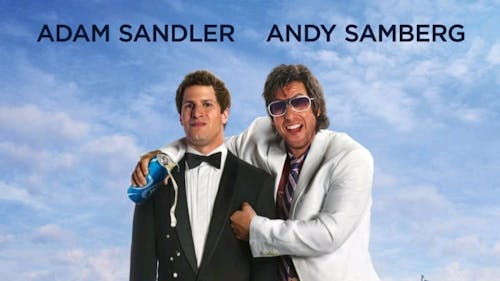Genius behind madness: Real critique of Adam Sandler's 'That's My Boy'

Following the unprecedented critical response to 2011’s “Jack and Jill,” which Rotten Tomatoes lauds for displaying a “committed performance from Al Pacino,” writer, actor and producer Adam Sandler faced an inflection point.
Sandler had faced the pressures of success before. Before creating the stunning experience that was “Jack and Jill,” he had been heir to another seminal film: 2010’s “Grown Ups.” But Sandler’s intricate mind — comparable perhaps only to Michael Bay’s — managed to one-up himself with “Jack and Jill.” Now he had to do it again.
Thus began production of 2012’s misunderstood gem, “That’s My Boy.”
The film boasts a wild, raunchy and downright disturbing premise. In 1984, grade school student Donny Berger, under the age of consent, had an affair with his math teacher, Mary McGarricle. This is obviously sexual assault, with the elder McGarricle taking advantage of Berger’s innocence.
But the situation somehow worsens. It would turn out that Berger impregnated McGarricle at some point during the sexual assault. The maligned math teacher’s crimes are exposed, and she is sentenced to spend three decades in a women’s penitentiary. But the court mandates that Berger’s father must care for the child in the meantime, and that once Berger turns 18, he will attain full custody.
Berger and McGarricle’s affair, along with its child-bearing implications, becomes the subject of widespread media attention, and Berger becomes a celebrity tabloid-fixture overnight, earning piles of cash on the way.
Unremorseful and even proud of his “affair” (read: rape), Berger lives a rockstar lifestyle and blows his money on alcohol, drugs and partying. He neglects his son, who he affectionately names Han Solo, which eventually leads to their estrangement.
Fast forward 28 years later, to 2012 (Sandler is known for an astute usage of contemporary setting), and Berger has wasted all of his cash, faces prison time due to tax evasion — he thought taxes were paid automatically — and has no idea what has become of Han Solo.
Needing $43,000 to pay his taxes to avoid the slammer, Berger seeks financial aid from Han Solo, or his "boy" (hence the film’s title), who Berger eventually finds out has become a wealthy financial genius.
I won’t spoil the rest of this masterpiece, but the main thing to know is that it jokes unrepentantly about sexual assault, racism, incest, child neglect and intercourse in general.
On the surface, the film is a crude, barbarous attempt at juvenile humor, and it occasionally teeters on being downright offensive. But I disagree with the superficial interpretation — rather, I opt to describe it as a postmodern, absurdist deconstruction of irony and its impact on critical issues.
For example, Berger’s childhood assault clearly has inflicted lifelong harm. He’s broke, emotionally immature and an alcoholic. But the film never explicitly tackles these issues — rather, they are used as the butt of several jokes. In one scene, at a cocktail party, Berger heads inside for bed, holding up a beer and proclaiming that, “Twenty’s my limit.”
In another scene, Berger talks with his old friend, rapper Vanilla Ice (played by Ice himself). But their friendship has dwindled. Ice said: “We were friends until you banged my mother!” Berger replies: “I didn’t know it was her, I swear to god! It’s not like her last name is Ice!” Clearly, Berger’s lasting sexual trauma, which causes him to act in such debaucherous ways, has impacted his interpersonal relationships as well.
Once Berger meets his son again, the film goes as far as to joke about Berger’s parental neglect. Han Solo said: “You know what I do remember? You making me drive you home from the beach ‘cause you got too drunk!” Berger scoffs, replying: “It makes sense to me. When somebody’s hammered, they have another guy drive home!” Han Solo is unamused, rebutting: “I was eight!”
The film was panned and critics were baffled.
“'That’s My Boy' is one of the most disgusting, morally reprehensible films I have ever had the displeasure of sitting through. It asks us to laugh at situations any sane human would find horrific, and desires our sympathy for detestable characters, all without having anything intelligent, meaningful or the least bit redeeming to say about its subject matter,” said Jonathan R. Lack for We Got This Covered.
But Lack's criticism is, well, lacking. The film is critiquing society’s inability to cope with tragic situations sans humor — and that such humor actually accelerates and deepens the damage of trauma. From Ice and Berger’s financial failures, Han Solo’s rough childhood and everything between, the tragedy of this film unrolls mainly due to the inability of its characters to get valid help.
If anything, the film was an artistic reminder that we cannot tackle our traumas or prevent future despair without confronting society’s dirty underbelly head-on. We cannot move forward with quips and irony. Critics felt sick after watching the movie because Sandler wanted them to — the film itself is a work of sheer, revolting genius, and I’d posit that Sandler did end up doing the impossible: topping “Jack and Jill.”



